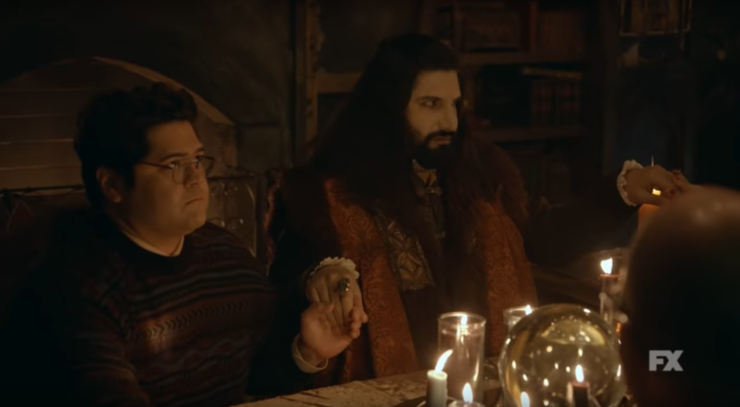A few weeks ago, comedic actor Fred Willard passed away. He was a personal hero of mine—a brilliant mind who, as numerous obituaries and remembrances pointed out, was a master of playing characters who were both unbelievably dumb and unbelievably earnest in their stupidity. While Willard was, obviously, one in a million, that precise combination of dumb and earnest, when well executed, is one of the mainstays of what I find funny.
That combination is also essentially what fuels the FXX show What We Do in the Shadows, which is about to finish its second season and has been one of the recent delights of my quarantine.
A spin-off of the 2015 Taika Waititi (Thor: Ragnarok) and Jemaine Clement (Flight of the Conchords) mockumentary of the same name, it is produced (and occasionally directed) by the original pair, and follows a trio of Old World vampires living in modern Staten Island. There’s Nandor the Relentless (Four Lions’s Kayvan Novak), a former general from the Ottoman Empire, Nadja (Stath Lets Flats’s Natasia Demetriou), a former Greek Romani villager, and Lazlo Cravensworth (Garth Merenghi’s Darkplace and Toast of London’s Matt Berry), an 18th-century fop and Nadja’s husband. They are joined by Guillermo de la Cruz (The Magicians’s Harvey Guillén), Nandor’s long-suffering familiar, and Colin Robinson (The Office’s Mark Proksch), perfectly cast as a lonely office drone with a secret life as an energy vampire.
The show’s central conceit is that vampires, as unchanging immortals, cannot wrap their heads around the modern world. That’s actually a core part of the vampire mythos as established by Bram Stoker. In Chapter 23 of Dracula, vampire hunter and philosopher Abraham van Helsing explains the vampire’s mental state: “[I]n him the brain powers survived the physical death. Though it would seem that memory was not all complete. In some faculties of mind he has been, and is, only a child […] Well for us, it is as yet a child-brain. For had he dared, at the first, to attempt certain things he would long ago have been beyond our power.” This idea of the child-brain continues throughout as a reason for why Dracula’s ragtag band of vampire hunters are able to defeat the centuries-old count. He is powerful and nearly impossible to kill, but his abilities to navigate the world in which he finds himself are limited.
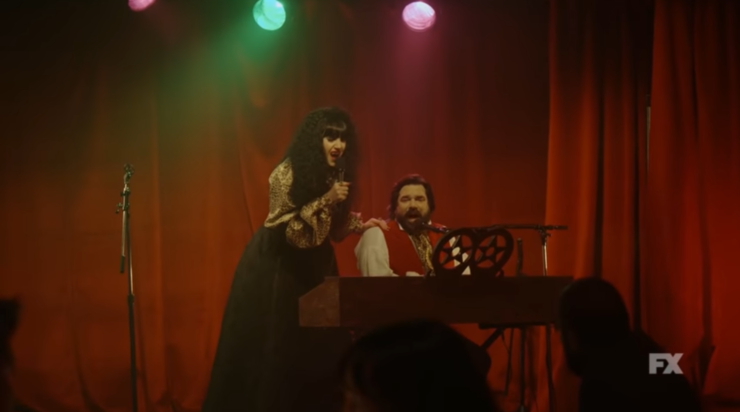
What We Do in the Shadows plays this confusion for maximum comedic value, and a part of the trick of making the show as entertaining as it is lies in combining it with the trope of vampiric arrogance. The “fish out of water” angle might have worn thin quickly, but the show gives its protagonists just enough understanding of the world around them to be prideful about asking for more help. A recent episode features Nandor eagerly checking his email, only to fall for a chain letter and spend the rest of the episode panicking over the curse while haughtily refusing help or reassurance from his familiar. Essentially, the show is built around the premise that vampires are too dumb to be effective and too arrogant to admit it.
Buy the Book
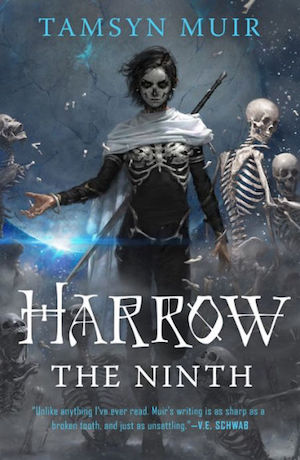

Harrow the Ninth
Much like the film on which it was based, the show is deeply in love with vampire tropes and the long cinematic history of vampires. Aficionados will have much to pore over, catching various offbeat allusions and references. In an early episode, Nadja gives a low-key reading of Gary Oldman’s infamously overacted Bram Stoker’s Dracula line, “I’ve crossed oceans of time to be with you.” And there is an episode towards the end of the first season that is studded with guest stars who’ve played vampires in other films and television shows, all of which are too delightful to spoil here.
As with most comedy that hinges on the vanity and stupidity of its characters, the humor works only as well as the delivery. In that regard, the cast is objectively fantastic. Filmed in familiar mockumentary style, the show gives its actors chances for sidelong glances towards the cameraman. But, in a show where there is no clear point of view character, such reactions and expressions serve to further engage the audience with each character’s idiosyncrasies. Demetriou’s exasperated eyerolls at her flatmates’ feigned machismo pairs wonderfully with Nadja’s complete lack of self-awareness where her own shortcomings are concerned. As Nandor, Novak infuses his fierce Ottoman warrior with a delight in chintzy aesthetics—a love of glitter and crepe paper (which he mispronounces as “creepy paper”)—and a childlike sense of wonder and terror when it comes to the modern world. Mark Proksch’s Colin Robinson seems to have fallen right out of The Office (on which he had a recurring role as Nate, one of the warehouse workers). He’s an aggressively boring sad sack who uses his tediousness to sap the life force from his victims—when he feeds, he arches his eyebrows impossibly high, opening his mouth in a shape equal parts predatory rictus and dopey grin.
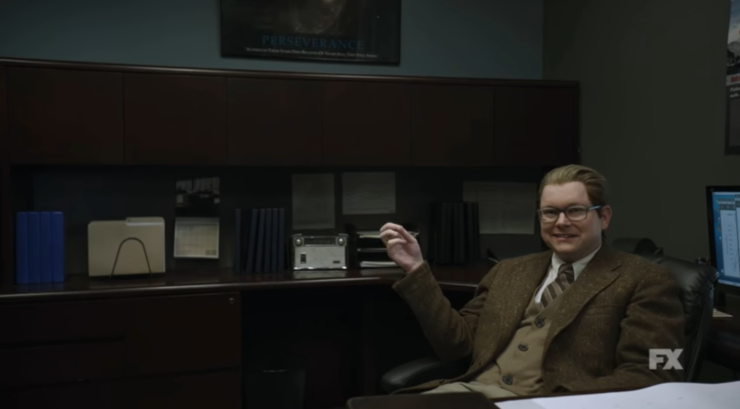
While Guillermo is initially teased as an audience surrogate, Guillén plays the faithful, long-suffering familiar as a deliciously low-energy split between melancholy and frustrated fury at his lot in life. And of course, Matt Berry, a legendary British comedian before this move to American TV, has a singular knack for delivering absolutely ridiculous (and often filthy) lines in an effete, over-the-top style whose pomp serves as punchline even if the writers weren’t doing an excellent job of giving him all sorts of absurd or odd turns of phrase (which they are, of course)—in a recent episode he confronts a rival by spouting, “time to die, me old fruit!”
And yet for all of its comedic chops, the show also excels at a kind of warmth which is hard to achieve in the modern sitcom. The mockumentary format, which found enduring purchase thanks to The Office (in its immensely popular British and American versions), lends itself to a cruelty and the sorts of cringe-humor based out of a writerly loathing for its characters. And the subject matter—vampires who have no compunction about killing innocent people and are woefully inept when it comes to self-examination—seems tailor-made for pitch black comedy. And it’s true that there are gags about gore and death…but the cruelty is never the point.
A scene in Taika Waititi’s original film illustrates the tone of both film and TV show rather well. In it, Waititi’s Viago invites a victim (Kura Forrester) back to his home to seduce and then murder. He gets into a conversation with her about her plans which include travel and a full life… one he is about to end. But, rather than let the dramatic irony of her impending death be the joke, the camera hangs on Viago’s increasingly uncomfortable and crestfallen face as he realizes, if only for a minute, that he is doing something monstrous. The cruelty is part and parcel of the genre, but both film and show wisely avoid getting the audience to invest in the vampires’ machinations as being funny in and of themselves.
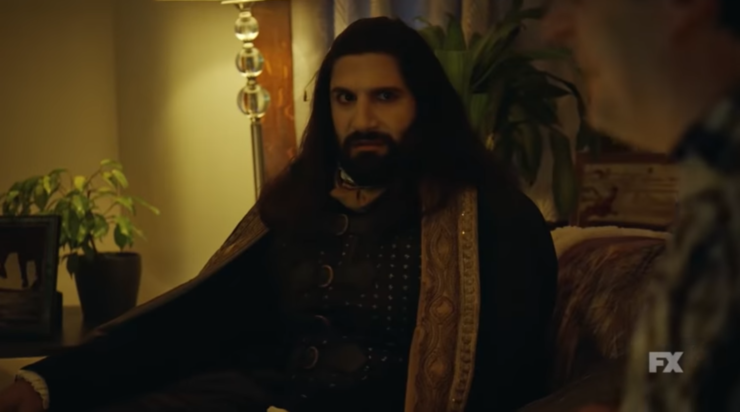
While the show occasionally goes out of its way to say that a particular vampire victim is a bad person, it more often tries to generate some pathos for the soon-to-be-dead. In the second season premiere, The Sixth Sense alum Haley Joel Osment plays Topher, Lazlo and Nadja’s new familiar. When he is inevitably killed a third of the way through the episode, the show finds humor not in the punishment of an odious frat boy but in the rising tensions between Guillermo and the newly zombified Topher, who now reduces all the bro-ishness of his character to monosyllabic, moaned demands for high fives.
All of this allows the show to develop relationships between its characters that border on touching. There is plenty of room for abuse and degradation in Nandor and Guillermo’s master-slave relationship, but the show chooses to both point toward the darker aspects of their situation and let them play the roles of patient caregiver and petulant charge more often than not. While Lazlo and Nadja’s marriage is founded on their unwholesome sexual appetites, the show still manages to paint a non-kinkshaming portrait of two weirdos who are still deeply in love with one another despite centuries of petty squabbles.
While the first season was fun, breezy, and delightful, the ongoing second season has elevated the show to one of the funniest on television. It manages to subtly advance an overall plot even while investing in hilarious bottle episodes that feature truly weird and inspired non sequiturs. If you feel like you might enjoy seeing the MCU’s Benedict Wong as a scat-singing Necromancer whose jazzy riffs keep cropping up despite his insistence that everything he says is a powerful magical incantation, this is the show for you. The second season also manages to keep plot points from the first season alive even when key players are absent: Booksmart’s Beanie Feldstein had a great recurring arc as a newly-made vampire in the first season and, though the actress couldn’t get her schedule to work for season two, her character’s actions continue to have an impact in the background in such a way that seems to ensure her eventual return.
All in all, What We Do in the Shadows might currently be the single funniest show on television: impeccably dumb, delightfully over the top, and full of unexpected care and affection for its characters. During this pandemic, when we’re all experiencing an endless need for entertainment, you should make sure this series rises to the top of your list. And hey, it’s already been renewed for season 3!
The S2 finale of What We Do in the Shadows airs on FX tonight, June 10th, at 10 PM ET; the series is also streaming on Hulu.
Tyler Dean is a professor of Victorian Gothic Literature. He holds a doctorate from the University of California Irvine and teaches at a handful of Southern California colleges. He is one half of the Lincoln & Welles podcast available on Apple Podcasts or through your favorite podcatcher. More of his writing can be found at his website and his fantastical bestiary can be found on Facebook at @presumptivebestiary.










